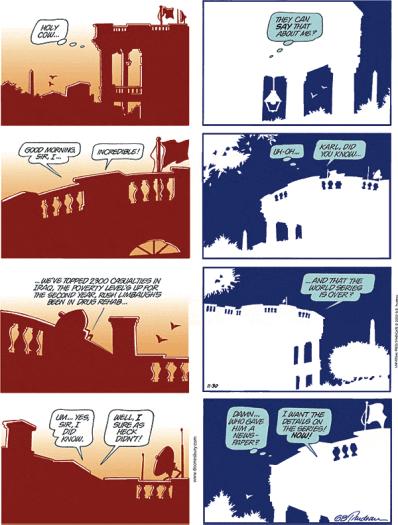I bow to better terminology: mass-market is much more accurate than open-enrollment. Students in my mass-market college are terrified of (if they're ever heard it) Liberal Arts. Most will describe themselves as undecided, pending, general studies, or gettin' my basics. When I urge them to declare themselves Liberal Arts majors, a look of horror passes over their faces. Of course, living in the Texas Panhandle, any mention of Liberal is akin to blasphemy. Over and over and over, students I encounter in my mass-market institution have no idea what Liberal Arts means. If this be (fair & balanced) frustration, so be it.
[CHE]
Liberal Arts and the Mass Market
By JOHN A. FLOWER
The millions of first-generation undergraduates now in mass-market institutions, like regional state universities and community colleges, have had little to no exposure to the power of thought within the liberal arts. They have no great interest in the life of the mind. The lack of experience on the part of these students in how to handle ideas -- as contrasted to the immediate, hedonistic response of their senses -- is both a national disgrace and a disaster. The inherent contradictions are highlighted by the billions of dollars spent on their "education'' in the public schools. These students desperately need the influence of the proven great thinkers of the past. They are not getting it.
This inherited thought cannot be presented to these college students in the same way that worked in the past for the select undergraduate students in privileged campus enclaves. As contrasted to yesteryear's full-time students, vast numbers of today's students at mass-market campuses are supporting themselves with outside jobs. They are enrolled part time and cannot fit themselves into the conventional and conveniently structured (convenient for professors) schedules of academic life.
Unfortunately, liberal-arts faculties in mass-market institutions have failed to understand the need to adjust their styles and methods of teaching to accommodate these everyday students who come from tract houses in the suburbs, trailer parks, walk-ups in urban areas, and public-housing projects. There are few books on the shelves of the homes where millions of our citizens live. While mounds of information can be downloaded from computers either at home or at workstations at school, surfing the Internet is no substitute for reading Aristotle's Nicomachean Ethics and then discussing it with a sensitive and responsive member of the faculty.
To connect these students to the power of ideas and to accommodate to their needs should be the primary mission of the liberal-arts faculty members of mass-market campuses. But this has not happened. Current and practical student needs have altered the missions of these campuses to exalted trade schools. The forces motivating most humanities faculties and those motivating students on these campuses are at odds.
I believe we must teach liberal arts to every one of the millions of current college students. For the most part (excepting upper-tier private colleges and not always those), I believe faculties are not doing a very good job of this kind of teaching. What do I think would help? It would help if humanities professors understood the motivations and ways of thinking of their students from the mass market. The differences in thinking between these professors and their students inhibit the transfer of vitally important concepts and ideas. Thus, liberal-arts and humanities professors periodically should get themselves out into the marketplace and onto the street in order to learn how to communicate better with their students. At regular intervals they should venture beyond their protected positions behind lecterns, in seminar rooms, or in library carrels, where too many of them churn out never-ending streams of papers and reports that have little or no significance and for all practical purposes are read by no one.
How to do this? The academic year plus the summer, which together have many more periods of recess than businesses and public organizations do, afford opportunities for professors of the liberal arts to do different things. Too many of them simply mow their lawns and paint their houses. A creative liaison between business and university departments (perhaps encouraged by some modest foundation funding) could provide opportunities for liberal-arts professors to experience what is going on in the worlds outside their academic departments. How wonderful it would be for a philosophy professor to have an internship at the City Council. What a fine opportunity it would be for a language professor to have an internship at the welfare office. Think how a history professor could benefit from identifying with an emerging business, or with an office in venture capital. This is what is needed in many hundreds of liberal-arts and humanities units serving the mass ma-ket of students. It has far more importance than sitting in shared-governance-committee meetings.
Teaching the liberal arts on mass-market campuses cannot be approached in the same ways that are effective in elite colleges with selected students from privileged homes providing well-prepared backgrounds -- where their conditioning makes an approach to humanities subjects much easier for the teacher. In mass-market institutions where students' aims are, first, to train for jobs and only second to become educated, teachers must create an intellectual environment where humanities subjects can be credibly approached.
John A. Flower is former president of Cleveland State University. This article is excerpted from his Downstairs Upstairs: The Changed Spirit and Face of College Life in America, published by University of Akron Press. Copyright © 2003 by John A. Flower.
Copyright © 2003 by The Chronicle of Higher Education
Sunday, November 30, 2003
Mass-Market Institutions?
Garry Trudeau Strikes Again!

The Amarillo Fishwrap doesn't carry the Sunday issue of Doonesbury. Instead, the Fishwrap just bought out Opus by Berke Breathed. Opus was a character in Bloom County which Breathed stopped doing several years ago. This latest stip just is NOT funny. Instead of Doonesbury, the Fishwrap opts for a second-rate version of Bloom County. If this be (fair & balanced) comic-rage, so be it!